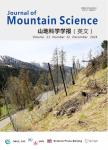Evaluation of soil erosion vulnerability in Hubei Province of China using RUSLE model and combination weighting method
作者机构:Key Laboratory for Geographical Process Analysis&Simulation of Hubei ProvinceCentral China Normal UniversityWuhan 430079China College of Urban and Environmental SciencesCentral China Normal UniversityWuhan 430079China Department of Civil and Environmental EngineeringUniversity of AlbertaEdmontonABT6G 1H9Canada
出 版 物:《Journal of Mountain Science》 (山地科学学报(英文))
年 卷 期:2024年第21卷第10期
页 面:3318-3336页
核心收录:
学科分类:082802[工学-农业水土工程] 090707[农学-水土保持与荒漠化防治] 0907[农学-林学] 08[工学] 0828[工学-农业工程] 09[农学] 0815[工学-水利工程]
基 金:supported by the National Natural Science Foundation of China(42377354) the Natural Science Foundation of Hubei province(2024AFB951) the Chunhui Plan Cooperation Research Project of the Chinese Ministry of Education(202200199)
主 题:Soil erosion vulnerability RUSLE model Combination weighting method Driving factors Spatial heterogeneity
摘 要:Soil erosion has been recognized as a critical environmental issue *** previous studies have primarily focused on watershed-scale soil erosion vulnerability from a natural factor perspective,there is a notable gap in understanding the intricate interplay between natural and socio-economic factors,especially in the context of spatial heterogeneity and nonlinear impacts of human-land *** address this,our study evaluates the soil erosion vulnerability at a provincial scale,taking Hubei Province as a case study to explore the combined effects of natural and socio-economic *** developed an evaluation index system based on 15 indicators of soil erosion vulnerability:exposure,sensitivity,and *** addition,the combination weighting method was applied to determine index weights,and the spatial interaction was analyzed using spatial autocorrelation,geographical temporally weighted regression and geographical *** results showed an overall decreasing soil erosion intensity in Hubei Province during 2000 and *** soil erosion vulnerability increased before 2000 and *** areas with high soil erosion vulnerability were mainly confined in the central and southern regions of Hubei Province(Xiantao,Tianmen,Qianjiang and Ezhou)with obvious spatial aggregation that intensified over *** factors(habitat quality index)had negative impacts on soil erosion vulnerability,whereas socio-economic factors(population density)showed substantial spatial variability in their *** was a positive correlation between soil erosion vulnerability and erosion intensity,with the correlation coefficients ranging from-0.41 and *** increase of slope was found to enhance the positive correlation between soil erosion vulnerability and intensity.



